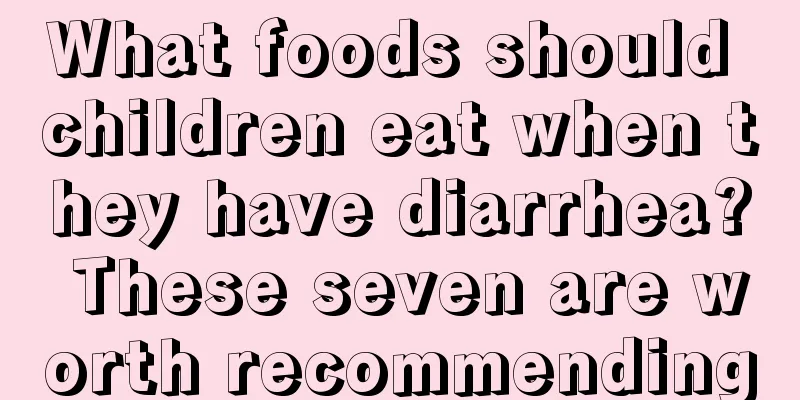Symptoms, prevention and treatment of cow's milk protein allergy in newborns

|
Newborns are allergic to milk protein and may experience eczema on their skin, stomach, and respiratory tract. The child may have sputum, cough, and even abdominal cramps, vomiting, and diarrhea. You should pay more attention to this condition. On the other hand, the child may refuse to drink milk or cry to varying degrees. In this case, you should pay attention to the possibility of an allergy. Parents can verify further. 1. Clinically, milk protein allergy mainly affects the skin, gastrointestinal tract and respiratory tract. The sick baby may develop rashes, hives or eczema on the skin or body; as for the trachea, it is common for babies to have excessive phlegm, sneezing, coughing or wheezing. Sick infants often have abdominal colic, vomiting and diarrhea in their gastrointestinal tract. They often cry and become restless after feeding. Although diarrhea is common, the degree of diarrhea varies greatly. From intermittent mild diarrhea to severe cases, the disease can cause intestinal mucosal atrophy and malnutrition. On the other hand, the baby may refuse to feed or even cry, which may cause shock in severe cases. Category 1: Initial reaction - appears 45 minutes after drinking milk, symptoms such as: abdominal cramps, diarrhea, vomiting, rash, eczema, occasional wheezing or sneezing. Category 2: Mid-term reaction - occurs 45 minutes to 20 hours after drinking milk. Symptoms such as vomiting and diarrhea Category III: Late reaction - appears 24 hours after drinking the milk. Symptoms include: diarrhoea, vomiting, wheezing or coughing. 2. Prevention 1. Generally speaking, compared with regular infant formula containing complete milk protein, breastfed babies have a lower risk of allergies, so breastfeeding is a more convenient way to prevent infant milk allergies. 2. Because the protein in breast milk is the same protein as the baby, it has a very low allergenicity. Breast milk also contains probiotics such as bifidobacteria, which can help the baby establish a healthy intestinal flora and train the baby's immune system, thereby reducing the risk of allergies. Treatment 1. Through the detection of allergens, if it is confirmed that the baby is indeed allergic to milk protein, how should the baby be fed and treated? Avoid foods containing milk 2. If your baby is allergic to milk, you should adopt a dietary elimination therapy, that is, strictly avoid eating foods containing milk ingredients in the next 3-6 months. Not only can you not drink regular formula milk, you can also not eat foods containing milk, such as cream cakes, bread, salad dressing, bovine colostrum, milk candy, and milk-containing biscuits, until the results of the "exclusion-provocation test" turn negative. Therefore, when choosing food for your baby in the supermarket, you must carefully read the ingredients of the food. Measures should be taken in the early stage when the baby's cow's milk protein allergy is not very obvious. Severe allergies may also cause shock. Therefore, the prevention and treatment of cow's milk protein allergy in newborns becomes very important. Generally, the baby's immune system should be trained more so that the risk of allergies can be better recognized. |
<<: Symptoms of milk allergy in newborns and ways to prevent allergies
>>: Pathological and clinical manifestations of pulmonary valvular stenosis in newborns
Recommend
What's wrong with the child's convulsions?
Children are always prone to various physical pro...
The dangers of acupuncture for children
In fact, acupuncture as a treatment method can al...
Treatment of myasthenia gravis ocular type in children
Many children are born with severe physical probl...
Why does my child’s face always turn red?
Some children always have red faces in winter. Ev...
Treatment of thick tongue coating in three-month-old baby
I don’t know if you know about the situation of t...
Which vitamin supplement is best for children?
Vitamins are indispensable nutrients in our body,...
How to relieve a child's fever of 43 degrees
Children are different from adults. Their physica...
What are the symptoms of hand, foot and mouth disease encephalitis?
Hand, foot and mouth disease is a common infectio...
Can babies with constipation drink sesame oil?
If your baby has not had a bowel movement for mor...
Can a five-month-old baby drink yogurt?
We all know that it is best to feed the child mai...
What to do if your child has fat particles
The main reason why children have fat particles i...
What to do if your newborn's stool smells sour
Although feces are relatively dirty excrement, th...
Newborn baby's hands and feet turn purple
Many parents of newborns will find that their han...
What are the latest treatments for cerebral palsy in children?
Cerebral palsy in children is also called cerebra...
New born baby girl bleeding
The body functions of a newborn baby girl are not...









